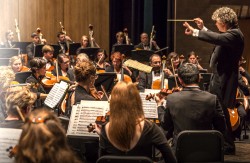Music | April 15th, 2016

Though the current weather doesn’t seem to indicate the fact, it has officially been spring for several weeks now. In the art and mythology of human history, this season has always been associated with new life bursting forth from the dead, barren landscapes of winter: a time for planting fields and gardens, for flora and fauna to create a new generation. All this is in preparation for the hardships of the next winter after which the cycle begins anew.
It is this intimate interplay between the two natural occurrences of life and death that helped inspire the theme of the FM Symphony Orchestra’s spring concert, a performance of Richard Strauss’ ‘Dance of the Seven Veils’ from his opera ‘Salome’, the ‘Carmen Fantasy’ of Pablo de Sarasate, and Carl Orff’s ‘Carmina Burana’.
“It’s sort of a pagan celebration of spring, how new life bursts forth out of winter,” said Linda Boyd, the executive director of the FM Symphony Orchestra. “These pieces are also about how love can transform into lust.” Boyd makes a point that this a great concert for those who are new to or previously have felt intimidated by classical music and the orchestra to visit. The pieces are rhythmic and easy to approach. “Music’s first job is to engage people,” said Boyd. So what are these pieces, exactly?
Richard Strauss was a German composer in the early to mid-twentieth century whose family was already a household name in Germany. He came from a distinguished multi-generational line of composers, such as his grandfather Johann Strauss, who composed the ‘Waltz of the Blue Danube’.
Strauss wrote several operas, one of which was ‘Salome’. In the New Testament, Salome was one of the daughters of the corrupt King Herod. The Gospels relate how she performed an exotic dance in the king’s court and in exchange was told that she could have anything she wanted, at which point she asked for the head of the preacher John the Baptist. She’s an early example of a femme fatale, a woman who uses her beauty and sensuality to entrap a man, often with deadly results. ‘The Dance of the Seven Veils’ represents the dance that she used to win King Herod over, and is often used as a stand-alone piece to introduce a night at the orchestra.
Building on the theme of the femme fatale, the ‘Dance’ is followed by the ‘Carmen Fantasy’ of Pablo de Sarasate, a famous Spanish violinist. This particular piece draws heavy influence from the earlier opera ‘Carmen’ by the French opera composer Georges Bizet, with much of it being variations on pieces from Bizet’s work, so you may recognize the melody of pieces like the ‘Habanera’ in the piece.
The opera itself dealt with the destructive love affair of a Spanish military officer named Don Jose, who runs away from his duty and his legitimate engagement to another woman to be with the sultry Gypsy woman Carmen. Carmen is too much of a free spirit to settle down in a long-term relationship, and when a bullfighter catches her eye Don Jose becomes jealous, with disastrous results. This piece will feature the talents of violinist Benjamin Sung.
Last but not least is German composer Carl Orff’s ‘Carmina Burana’. Boyd points out that the bawdy origins of that piece are from the notes that monks left in manuscripts at their monasteries. Back in the day, if you weren’t a firstborn son, there was a good chance you would be shuttled off to a monastery, often against your will. The strict regimen of a monk, including the vow of celibacy, wore on a lot of unwilling monks, who would scribble poems about women, drink, the vicissitudes of fortune, and more in the margins of the manuscripts they copied.
These Latin and old German poems form the vocal aspect of the piece, which will be performed by the FM Choral Artists, NDSU Concert Choir, and FM Youth Choir, as well as incorporating soloists baritone Mark Womack, soprano Marianne Lemieux-Wottrich, and tenor Joseph Gaines. The translation of the vocals will be projected behind the choir. It is a simplistic piece with no complex harmonies but at times utterly transcendent. Chances are you have even heard the opening and closing piece ‘O Fortuna’ in any number of film trailers or commercials, which makes these a concert staple for many orchestras.
For those who are interested, 45 minutes before the concert begins there will be a Q&A segment with the conductor. A new feature this year is that beverages will be served before the concert as well as during intermission. Altogether, the pieces will last approximately an hour and forty-five minutes. So whether you’re an aficionado of the orchestra familiar with these pieces or dipping your toes in for the first time, this weekend will be an excellent entertainment opportunity.
IF YOU GO
Carmina Burana
Saturday, April 16, 7:30 p.m.
Sunday, April 17, 2:30 p.m.
NDSU Festival Concert Hall and Beckwith Recital Hall
12th Ave. N and Bolley Dr. Fargo
Students 10-15
Adults 25-35
5 dollar rush tickets at door with student ID
March 2nd 2026
January 12th 2026
September 16th 2025
August 19th 2025
June 9th 2025



_(1)_(1)_(1)_(1)_(1)__293px-wide.jpg)
_(1)_(1)_(1)_(1)_(1)__293px-wide.jpg)
